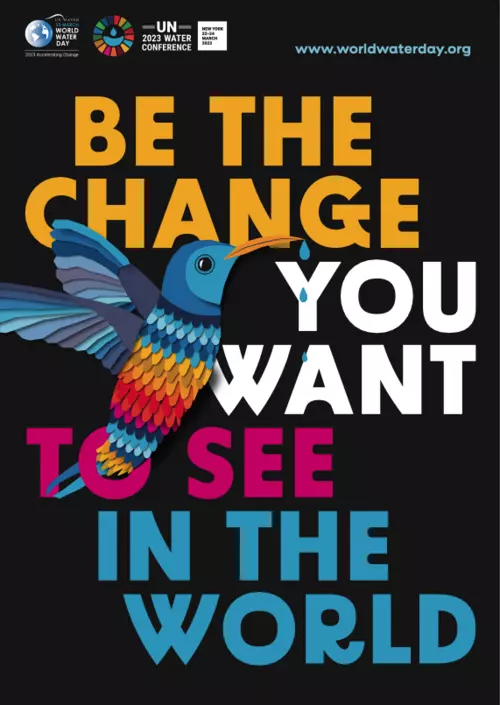NEW YORK – Many Pagans are aware that water is one of the four spiritual elements. It is essential for life. As many paths and faiths note, water is life. Unfortunately, access to water is under threat worldwide.
A report released this morning by the United Nations Educational, Scientific and Cultural Organization (UNESCO) describes a dire future with limited water resources. The report was released ahead of its 3-day 2023 Water Conference beginning today in New York with plenaries, colloquia, films, and other connected events focused entirely on water access.
The UN Water Conference is the first UN water summit since 1977. It is co-hosted by the governments of Tajikistan and the Netherlands. The summit is expected to bring about 6,500 participants, including 100 ministers and a dozen heads of state and government to New York. In remarks in February, Sulton Rahimzoda, Special Envoy of the Republic of Tajikistan for Water and Climate tweeted, “We don’t have another 40 or 50 years to wait. The next generation will not forgive us if we do not take more and much faster action on water.”
The UN declared March 22 World Water Day in 1993 to raise awareness of the 2 billion people living without access to safe water. Access to water and sanitation is one of the UN sustainable goals for 2030 which it describes as “seriously off-track.” It notes that today is an opportunity to recognize that “billions of people and countless schools, businesses, healthcare centres, farms and factories don’t have the safe water and toilets they need.”

The Water Conference is preceded by a flagship report released by the UN. It notes that “water starts wars, puts out fires, and is key to human survival, but ensuring access for all hinges largely on improving cooperation.”
The report warns that “scarcity is becoming endemic” not only because of pollution but also from overconsumption of resources. The world is experiencing additional stressors related to water availability because of an increase in seasonal water shortages due to global warming. The effect is expected in areas that are abundant with water resources as well as those already experiencing strain.
The report underscores the urgency for global cooperation to ensure safe access to water.
Richard Conner, the lead author of the report, noted that “water is the medium through which climate change will affect societies and the environment the most” while pointing out, “The term ‘water’ is completely absent from the Paris Agreement.”
The report notes that the global urban population that is facing water scarcity is likely doubling right now, from about 930 million people in 2016 to between 1.7 and 2.4 billion people by 2050.
Conner said, “If we don’t address it, there definitely will be a global crisis,” adding that the figures above point to the rising scarcity of water resources, not to mention its use in industrial activity and agriculture. He added that economic water scarcity is already a major problem in parts of Africa due to governmental failure to acknowledge the seriousness of the problem.
Echoing the urgency for water solutions and the pending emergency described within it, Secretary-General of the United Nations, António Guterres said, “The UN 2023 Water Conference in March must result in a bold Water Action Agenda that gives our world’s lifeblood the commitment it deserves.”

Conner predicts “water wars” without a plan to address water resources, but that water itself actually “tends to lead to peace and cooperation rather than to conflict.” Strengthening transboundary cooperation is a major means to rising tensions that can result in conflict, he said during a press conference.
153 countries share nearly 900 rivers, lakes, and aquifer systems, and more than half have signed agreements. The Great Lakes of North America shared by the US and Canada for example are one such agreement between two nations. The Great Lakes are the largest group of freshwater lakes on Earth and account for about 21% of the world’s surface freshwater by volume.
A panel of 18 UN independent experts and special rapporteurs also released a joint statement ahead of the water conference. They noted that water must be “managed as a common good, not a commodity.”
They wrote, “Considering water as a commodity or a business opportunity will leave behind those that cannot access or afford the market prices,” noting that progress on sustainable development goal #6 can only happen successfully by centering discussions on the human rights of communities.
“It is time to stop a technocratic approach to water and consider the ideas, knowledge, and solutions of indigenous peoples and local communities who understand local aquatic ecosystems to ensure sustainability of the water agenda,” they added. Commodification of water will inevitably “derail achievement of the SDGs and hamper efforts to solve the global water crisis.”
UN Undersecretary-General Usha Rao Monari is the official host of the UN Water Conference. “There is enough water on the planet if we manage it more effectively than we have managed it over the last few decades,” she said. “I think we will have to find new governance models, new finance models, new models of using water and reusing water than ever before. I think that technology and innovation will play a very large role in looking at how to manage the water sector and the use of water.”
Opening festivities of the conference began Monday afternoon led by traditional Tajik musicians, as well as a water blessing from Grandmother Clara Soaring Hawk, Ambassador Ramapo Lenape Nation NY/NJ Deer Clan.
The Wild Hunt is not responsible for links to external content.
To join a conversation on this post:
Visit our The Wild Hunt subreddit! Point your favorite browser to https://www.reddit.com/r/The_Wild_Hunt_News/, then click “JOIN”. Make sure to click the bell, too, to be notified of new articles posted to our subreddit.